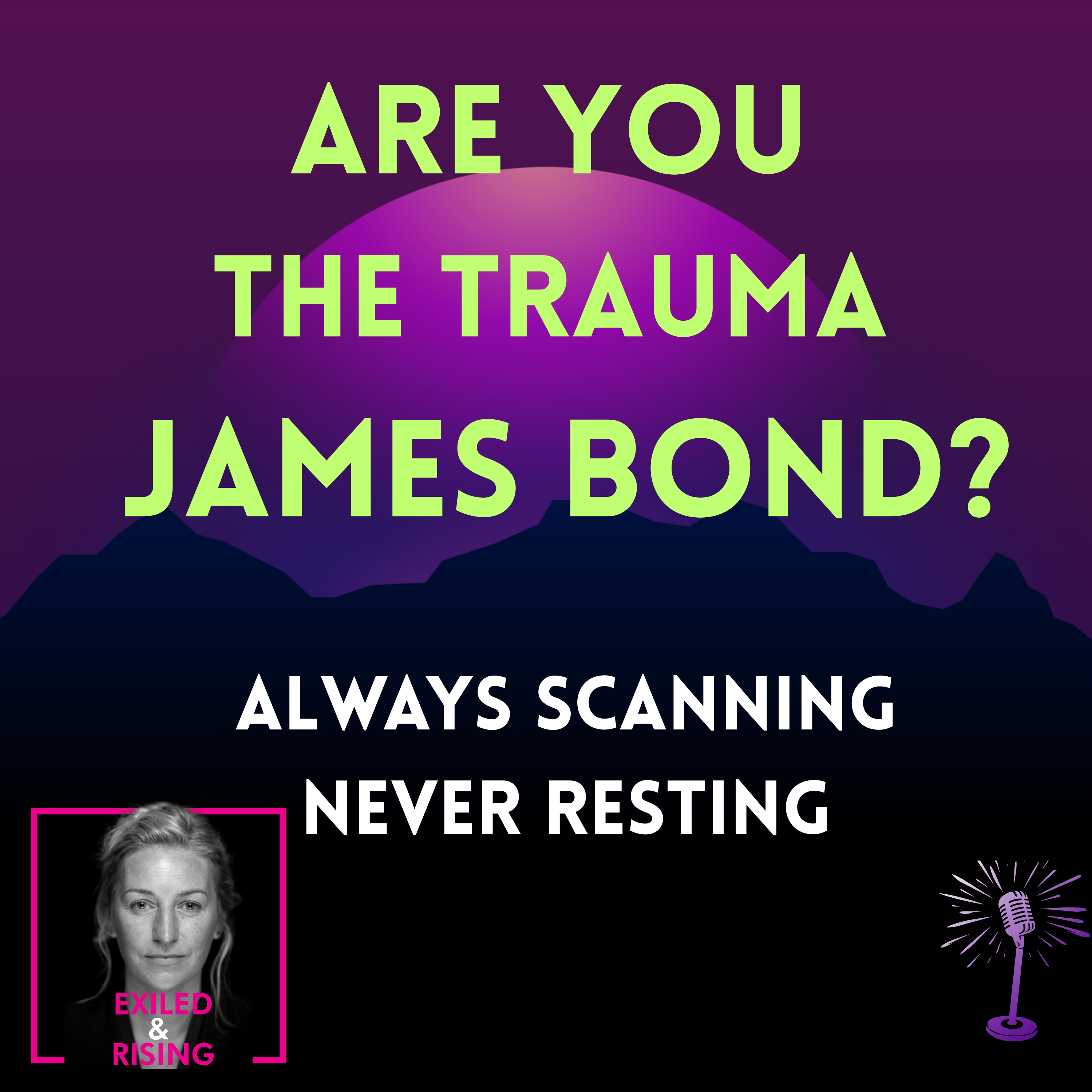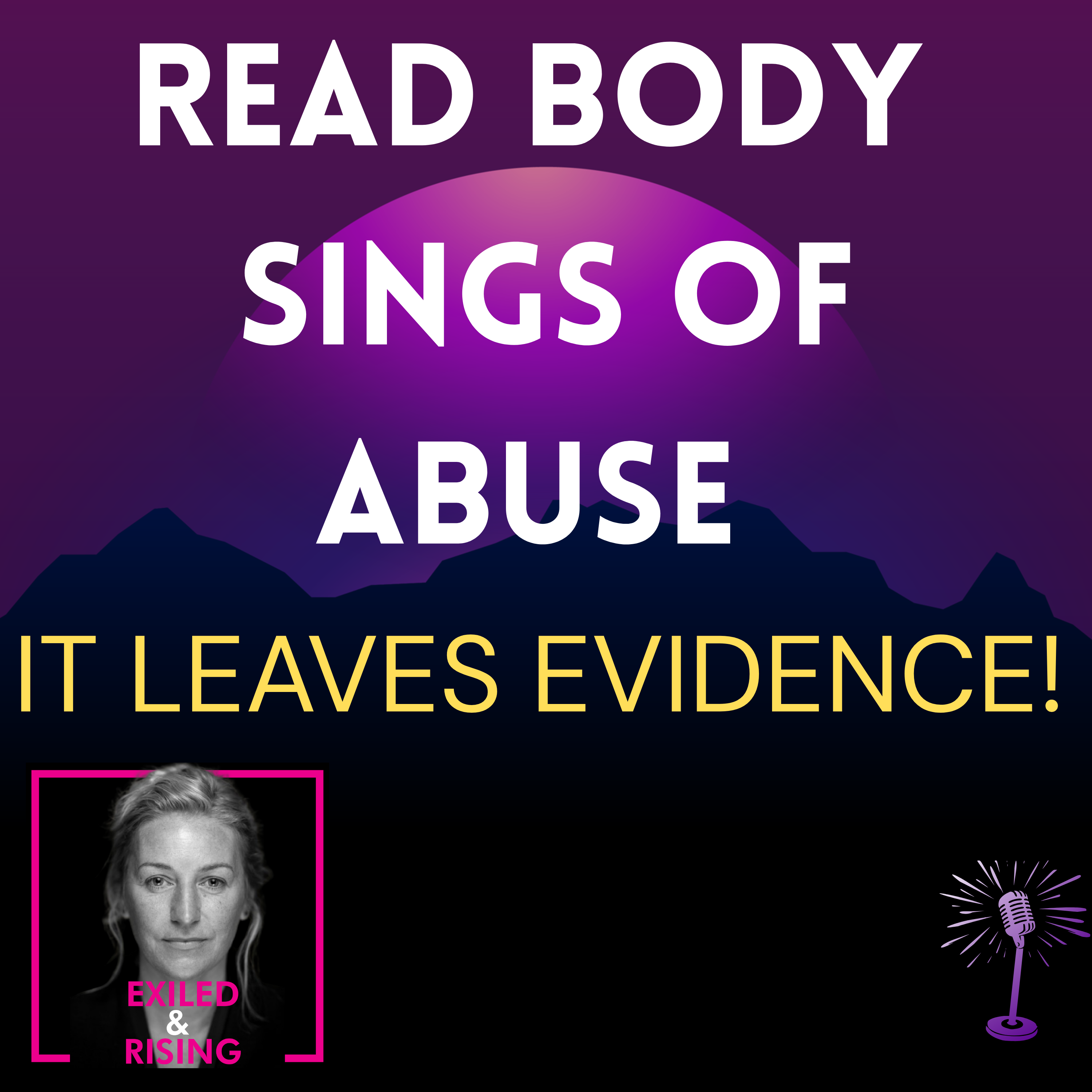Episode Transcript
[00:00:00] In this episode, we will talk about hypervigilance, the genius of your PTSD and the cost of it.
[00:00:10] Also know you don't need to live through the war to have a ptsd. Your war can be inside of your family.
[00:00:22] Welcome to Excellent Rising. I am Anna Mail.
[00:00:27] When you live through the war, you don't forget where the exits are. You don't forget the sounds of bullets, grenades, blackout windows, or how fast a normal evening can turn into a race for life.
[00:00:45] And how you live not from a day to day, but how you live from a minute to the minute.
[00:00:56] I was 14 when the war began in the former Yugoslavia.
[00:01:01] Eight years of learning how to predict the unpredictable in the war zones.
[00:01:10] I'm a Serbian from Croatia, and I experienced my home being detonated, not being allowed to go in bomb shelters because of my ethnicity.
[00:01:23] I lived and we escaped in Sarajevo.
[00:01:28] There we went again through another horrors of war, and then third one, living throughout the bombing in Serbia.
[00:01:41] And each place was teaching the body another rule for staying alive and being hypervigilant continuously.
[00:01:58] So even decades later in peace, body still plays the same game, the same adaptation.
[00:02:09] In a restaurant, you're scanning corners, you're tracing escape routes, you're calculating which door leads to safety if something explodes.
[00:02:22] And this is very real.
[00:02:25] This is very real.
[00:02:27] I lived in this state for a very long time.
[00:02:30] If I get triggered, I absolutely know that part of me will show up.
[00:02:37] And I'm calling this part Trauma James Bond.
[00:02:43] And in this episode, we will talk about hyper vigilance, the genius of your PTSD and the cost of it.
[00:02:56] Also know you don't need to live through the war to have a ptsd. You were can be inside of your family.
[00:03:05] If you're a minority inside of the system, you're oppressed.
[00:03:13] It can be inside of your body if you are dealing with difficult illness, right?
[00:03:23] And that will place you in a constant state of vigilance.
[00:03:31] So I will read from my book the Trauma. We don't talk about the peace trauma James Bond and how we trauma survivors become one of the best strategists of survival and how that brilliance can soften when body finally believes the war is over.
[00:03:59] Because survival very primal, its strategy and healing is the moment you notice you don't need a plan B to escape.
[00:04:16] Also, healing begins.
[00:04:20] Then you start using a humor.
[00:04:24] One of the best humor was born in bomb shelters. For me, humor had this potency to diffuse terror.
[00:04:40] So humor not as a tool to minimize or dissociate, but it's a gift to diffuse the potency of a theater and still fully be aware of where you are.
[00:04:57] If you're looking at comedians and standup comedians, they know the best humor was born from very dark places in their lives and ability to use that from a witnessing place with a dose of humor is healing.
[00:05:21] So let's begin.
[00:05:23] This is the trauma James Bond.
[00:05:29] If someone is afraid of terrorist attacks, the apocalypse or any outside threats, they should stick with their trauma survivor friends.
[00:05:44] No one knows how to quickly escape from restaurants, theaters, events, subways or highways better than them.
[00:05:55] While their friends are settling into their table at restaurant, ordering drinks, checking what's new on the menu, taking selfies and chatting with others, their trauma survival friend is on high alert.
[00:06:15] They make sure they are sitting at the best table which they booked way in advance.
[00:06:23] So they are close to the exit and with their backs to the wall where they can scan the rooms for threats.
[00:06:36] And then with the focus of surgeon, they have already calculated how quickly they can escape through the door in case of an attack.
[00:06:49] They have mentally mapped all the exits. They even know how to get out, uh, through the window if necessary.
[00:06:58] They never know if people will be a bunch of morons and block the exit or run back if they left something behind.
[00:07:10] That won't stop the trauma survivor, but it's hard to know with ignorant people.
[00:07:18] So the doors are covered, the windows are a good option. And what a thrill. There is a balcony with strong ivy growing along the wall which they scanned when they entered the building.
[00:07:32] That's a great third exit option.
[00:07:36] The rest is a piece of cake. Once they are out and on the ground, they know to go northeast through the park around elementary school and then vest beside the newly opened gym. And yes, they know where to call a taxi that can take them on their pre planned route to safety 3 hours northeast or even further away if needed.
[00:08:06] Of course they also have cash with them. Um, for emergency.
[00:08:12] They have to be ready at all times.
[00:08:15] They even hid PA pain medication safely in their wallet.
[00:08:20] Because they cannot be unprepared for possible injuries or sudden onset of diarrhea.
[00:08:28] Nothing is going to stop them from surviving.
[00:08:35] By the time everyone else is focused on the dessert, their traumas revive. Your friend might take a tiny breath and relax, but rest assured they're always alert and ready to escape and keep everyone safe.
[00:09:05] This is trauma James Bond from my book the Trauma we don't Talk about Pages 109. If you want to get the book, the link is in the show notes.
[00:09:21] So let's begin.
[00:09:22] Let's go into the deep Dive behind this piece.
[00:09:29] If you're a soldier, if you're a veteran, if you survive genocide, if you are in the midst of going through the genocide and war, you know this place very deeply.
[00:09:46] Also, if you have been so vigilant in your family growing up, you know that place as well.
[00:09:55] If you're a person of color, if you're indigenous person to this land, you, you know this place of vigilance.
[00:10:04] Me as someone who went through continuous bombing, grenades, bullets around me, hyper vigilance wasn't neurosis.
[00:10:18] And today, as you know, I work and run. I'm a founder of Somatic Trauma Recovery Center. They're part of my work is working with survivors of displacement, war and genocide. And please, if this resonates with you, support this show by donating all the money, all the funds are going into making this podcast possible and also carving out time so we can have more support and help for people who went through the war, who went through being exiled and who lived in chronic state of hypervigilance because of gun violence.
[00:11:03] As you can see, there is no ads, so we don't disrupt the flow and the depth of this and any episodes in exile and rising to go back. Hyper vigilance. Do not look your hyper vigilance as neurosis.
[00:11:21] It is innate intelligence by every movement in the story.
[00:11:29] And you absolutely can spot yourself as well.
[00:11:34] Choosing the seat with your back to the wall, memorizing exits, hiding medicine is direct translation of wartime muscle memory.
[00:11:49] You learned that safety equals control.
[00:11:53] Everyone who went through the abuse again, you don't need to go through the war to feel this way.
[00:12:00] If you lived with a raging father or a mother, or raging or still living with raging abusive partner, this is your war zone.
[00:12:14] So you learn safety equals control.
[00:12:17] And that lesson, that muscle embodied state, never expired.
[00:12:25] And also I use the humor because when we develop self awareness and when we honor what happened to us, this humor, not to dismiss and deny the story and experience, it replaces terror. It gives us autonomy of what has been done. And yet we are not minimizing that because now we can tell, we can share the story of what once completely controlled us.
[00:13:12] And in a therapy language, I'm describing sympathetic, dominant nervous system, constant scanning, anticipating things, readiness to flee.
[00:13:28] And yet I'm refusing to pathologize this. Please do not pathologize your ptsd.
[00:13:38] Do not.
[00:13:40] Because, uh, name I'm using James Bond. It's a spy archetype, right? It reframes and restores dignity.
[00:13:51] And this problem, pathologizing PTSD which absolutely is difficult to live inside of PTSD body.
[00:14:01] But I also want you to see your PTSD as a source, unwanted source. And yet we have it.
[00:14:14] It's a skill, skill of precision, of speed, resourcefulness. There is a big clarity in hypervigilant state.
[00:14:30] We just know what to do next and what's very important here. We need to humanize hypervigilance. If we label PTSD and if you see a PTSD as your enemy, it will stir up even more of your hypervigilance state because you cannot escape yourself, right?
[00:14:56] So let's just, uh, drop this shame around PTSD and being hypervigilant and healing begins not by suppression, not by scrutinizing and weaponizing our trauma or, uh, our trauma states, but by gratitude for the strategy that worked and still works.
[00:15:29] Still works.
[00:15:31] This is the biggest tool you have right now.
[00:15:35] If you're facing displacement, if you are in the war, if you are with someone who is unsafe, you are not dropping down your hyper vigilant state.
[00:15:51] You want on it. You want that on it until you get to the safety. I used as a somatic experiencing therapist, right?
[00:16:08] I use the state of body, which is always on this quick scanning alert, and at the end, take a tiny breath and relax.
[00:16:25] That microbreath is the first felt sense of now.
[00:16:33] So if your body was measured safety in seconds, between bombing, between grenades, there is a rhythm. You know the rhythm, right?
[00:16:45] Most of the time, you know the rhythm of the bombing of the grenades.
[00:16:50] So we build that rhythm of safety, right? And in this case, the breath presents the end of wartime.
[00:17:04] The nervous system learning that the present can last.
[00:17:11] Body doesn't speak in words, but it speaks in now I can inhale and exhale, and that's beginning of your work as well.
[00:17:27] Can I exhale in this moment, right now into my safety?
[00:17:35] Can I?
[00:17:36] If you're at a safe place, can I let go of my James Bond?
[00:17:44] James Bond has everything covered for me.
[00:17:48] I'm safe. He's controlling.
[00:17:52] And now m. I can take a breath fully.
[00:17:56] I can let go of my belly so it's not so constricted.
[00:18:03] I can unclench my toes.
[00:18:07] Oh, uh, right. We know that one very common.
[00:18:13] You know how to keep everyone safe.
[00:18:19] So if you're living and coming from this state, if you're coming from the war zone, place of unsafety, you know how to protect your siblings and your neighbors.
[00:18:36] And there is a, uh, deep solidarity is born from the place of horrors.
[00:18:44] Deep solidarity. We just know by default you help your neighbors and that hypervigilance also give us ability to sense subtle shifts in others in tone, in gaze, in breathing.
[00:19:06] Why therapists are wounded healers because they have the skill of observing, of noticing.
[00:19:14] Right.
[00:19:15] And also we need to be aware of this phone reflex which is involved in over care.
[00:19:23] Taking over responsibility for others.
[00:19:26] Right?
[00:19:27] Being ready next second for everyone.
[00:19:31] So what's very important?
[00:19:33] The war for me ended but vigilance didn't.
[00:19:38] For you, your war ended, uh, but your vigilance maybe didn't.
[00:19:46] Healing is not forgetting the exits.
[00:19:51] Your brain will always go to the exits.
[00:19:55] But realizing you no longer need to stare at them.
[00:20:04] You don't need to keep your shoulders up. Uh, you can keep them up while you're noticing the exits.
[00:20:19] And next thing lower down, um, move to the gravity state.
[00:20:25] Think about.
[00:20:27] So this is your assessment.
[00:20:31] This is your assessment.
[00:20:33] What can move you into the more regulated state you assess yourself by? Huh? Um, is my body after the scanning the exits escape routes in still anti gravity state or in gravity state?
[00:21:00] Or if it's still in anti gravity. So that's this preparedness. I'm about to jump. If you have a dog, a cat, you know that place, right?
[00:21:09] Preparedness to jump antigravity state.
[00:21:14] Well, uh, not now. I am safe. I have my James Bond covered.
[00:21:20] Let me move to the state of gravity so we don't work. And I'm not believer in a therapy in the healing as damage repaired. There is no damage.
[00:21:36] There is no damage. Thank goodness we had this or still have.
[00:21:41] And we need to develop this soul literacy and nervous system literacy. Why this was on or still is. And how can we move into more regulated state.
[00:21:54] So how do we move our body from this anti gravity preparedness state of hyper vigilance to the state of gravity and feeling regulated.
[00:22:08] Please check the links below.
[00:22:11] I am running the distilled somatic lessons for PTSD recovery.
[00:22:18] Their voice go step by step.
[00:22:23] How to move our body into the regulated state, into the state of gravity.
[00:22:29] Distilled somatic experiential lessons link is in the show notes.
[00:22:38] So your James Bond that system once predicted bombs, predicted rage, predicted abuse, predicted oppression.
[00:22:53] Also now has deep intelligence. Do not underestimate this ever.
[00:23:00] It has intelligence for healing.
[00:23:05] Where this revival intelligence becomes your innate body. Intelligence to recover when it learns to rest.
[00:23:19] To summarize, constant scanning. Preparing for worst case scenarios.
[00:23:26] Being the responsible one is familiar to anyone who has experienced prolonged trauma, war, death, gun violence, abuse, displacement or chronic uncertainty.
[00:23:44] And hypervigilance is universal.
[00:23:47] It's not only for someone who went through the War.
[00:23:52] So soldiers, refugees. Yes. Displaced people. Yes.
[00:23:58] Abuse survivors.
[00:24:00] Yes. Frontline workers.
[00:24:03] Yes.
[00:24:05] Children from chaotic homes, abusive homes, abusive relationship.
[00:24:14] Okay.
[00:24:18] And also what we want to normalize, we need to normalize. We need to say and to teach others.
[00:24:26] You are not crazy.
[00:24:28] You are prepared.
[00:24:33] You are not crazy. If you have those pain medications in your wallet, if you are scanning your exits and you have routes, which I did.
[00:24:44] How to escape the most peaceful country on this planet. Now where I live is Canada.
[00:24:51] I had a, uh, route in my mind how to escape from Young and Eglinton, where I live in Toronto, all the way up north and no one is going to stop me. And oh boy.
[00:25:06] Mhm. I had that preparedness and probably still have. If it's needed, it's on it. It's on it. My James Bond is semi retired, right?
[00:25:22] And I'm laughing and with full heart and kindness to this pattern. But I'm not shaming. I absolutely know. I know it's funny for someone who didn't went through this and yet this is very real for many of us.
[00:25:48] No shaming. No. Absolutely no shaming. Okay.
[00:25:53] All of this, what I described and I read again at the end, is life for many. And why is this so important now? Uh, on collective level.
[00:26:06] On collective level, we are facing very uncertain times and there is a buildup of collective hypervigilance.
[00:26:21] News feeds keep everyone scanning for danger. And now we have this global nervous system that's always on alert and we need to invite this public dialogue awareness where we need to name things and encourage compassion instead of judgment for those who appear rigid, controlling or too prepared.
[00:26:50] There is so much judgment about people who are not relaxed, who are not spontaneous shaming.
[00:27:01] And that's not okay.
[00:27:05] That's not okay. So please, if you know anyone who is controlling and rigid and facing ptsd, share this episode.
[00:27:16] It will end in, uh, good hands.
[00:27:20] But we need to bring more awareness. We need to talk about this. We need to normalize the states we are living in for everyone who is high achiever. But you cannot switch off.
[00:27:36] There is a vigilance in the history of what prompt that being on 247 for parents who cannot relax until everyone is safe.
[00:27:53] Underlying vigilance, right? And the inquiry here is when does vigilance stop protecting us? When is a time you can retire your James Bond, right?
[00:28:11] And then your James Bond is so hardworking past his retirement age and preventing you from living and enjoying that dinner with your friend. If you recognized yourself in this story, if you also keep an eye on the exits, know this nothing about you is broken.
[00:28:39] Your vigilance was intelligence.
[00:28:44] It kept you alive.
[00:28:48] Maybe it still keeps you alive.
[00:28:53] And the work now is. Is teaching your body that safety now maybe is not in control but in a rest.
[00:29:09] And that you can still know where the exits are and choose not to look at them all night.
[00:29:24] I lived through genocide. I am Serbian, from Croatia. Unrecognized genocide, war in Sarajevo, bombing in Serbia.
[00:29:35] And today I am somatic experiencing therapist for PTSD and trauma recovery, helping those who were in my shoes and who are still living what I live through.
[00:29:51] And I learned that the same nervous system that once saved your life can learn how to live it again.
[00:30:03] And how your James Bond can safely retire and come in when it's needed.
[00:30:14] Thank you for listening, for remembering, for breathing with me, for honoring your James Bond.
[00:30:26] I uh, will read this piece again.
[00:30:31] And please be gentle with yourself.
[00:30:36] Be gentle with yourself.
[00:30:39] This is excellent. Rising.
[00:30:41] I am Anna Mael.
[00:30:44] Until next time.
[00:30:45] Much care.
[00:30:47] Much care.
[00:30:49] This is the trauma James Bond.
[00:30:55] If someone is afraid of terrorist attacks, the apocalypse or any outside threats, they should stick with their trauma, uh, survivor friends.
[00:31:09] No one knows how to quickly escape from restaurants, theaters, events, subways or highways better than them.
[00:31:20] While their friends are settling into their table at restaurant, ordering drinks, checking what's new on the menu, taking selfies and chatting with others, their trauma survivor friend is on high alert.
[00:31:40] They make sure they are sitting at the best table, which they booked way in advance.
[00:31:48] So they are close to the exit and with their backs to the wall, they're taken, scan the rooms for threats and then with the focus of surgeon, they have already calculated how quickly they can escape through the door in case of an attack.
[00:32:14] They have mentally mapped all the exits. They even know how to get out through the window if necessary.
[00:32:24] They never know if people will be a bunch of morons and block the exit or run back if they left something behind.
[00:32:35] That won't stop the trauma survivor, but it's hard to know with ignorant people.
[00:32:43] So the doors are covered, the windows are good option. And what a thrill. There is a balcony with strong ivy growing along the wall which they scanned when they entered the building.
[00:32:58] That's a great third exit option.
[00:33:01] The rest is a piece of cake. Once they are out and on the ground, they know to go northeast through the park around elementary school and then vest beside the um, newly opened gym. And yes, they know where to call a taxi that can take them on their pre planned route to safety.
[00:33:26] 3 hours northeast or even further away if needed.
[00:33:31] Of course they also have cash with them for emergency.
[00:33:37] They have to be ready at all times.
[00:33:41] They even hid pain medication safely.
[00:33:45] They even hid pain medication safely in their wallet.
[00:33:49] Because they cannot be unprepared for possible injuries or sudden onset of diarrhea, nothing is going to stop them from surviving.
[00:34:05] By the time everyone else is focused on the desert, their trauma survival friend might take a tiny breath and relax.
[00:34:18] But rest assured, they're always alert and ready to escape and keep everyone safe.
[00:34:35] This is trauma. James Bond from my book the Trauma We don't talk about pages 109.



